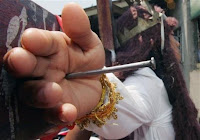Friday, 28 March 2008
Monday, 24 March 2008
The perils of crucifixion
 The Philippines government issued an Easter public heath warning - on the dangers of crucifixion.
The Philippines government issued an Easter public heath warning - on the dangers of crucifixion.Did it read, Don’t do it, it’s nuts?
Did it fuck.
Instead of warning people against self-harm in the name of the Catholic church, it simply advised them to get a tetanus jab first and "use clean nails."
Well fuck me, I think rusty ones would be better for people with the (lack of) brains to crucify themselves. In a kind of Darwin Awards way, it’d give them more chance of removing themselves from the gene pool.
It’s good to see corporate social responsibility alive and well and living in the Catholic world too. The crucifixions in San Fernando City – where 23 people, including two women, were nailed to crosses at three improvised Golgothas – were sponsored by Coca-Cola.
Ahem.
Tuesday, 18 March 2008
The grapes of wrath
 The world’s gone mad – we all know that. But this story proves that there’s still a modicum of common sense left in it.
The world’s gone mad – we all know that. But this story proves that there’s still a modicum of common sense left in it. An accountant who tried to sue Marks & Spencer after he slipped on a grape and injured himself has lost his case and been ordered to pay legal costs.
Alexander Martin-Sklan, 55, sued for more than £300,000 over the 2004 incident in which he said a squashed grape from the store got lodged under the sole of his right sandal, causing him to slip and fall.
He said he suffered a ruptured quadricep, adverse psychological effects and depression following the incident, which meant that his business suffered and he could no longer ski or play tennis.
No longer ski or play tennis? The poor fella.
But the judge ruled against him, determining that while there may have been a grape or some "crushed fruit or similar" on the sole of Martin-Sklan's sandal, he was not persuaded that it "caused the claimant to slip."
The judge clearly has his head screwed on. He said: "In my judgment it was one of those accidents that could happen to anyone." Too many times these days – and especially in the USA - “accidents that could happen to anyone” result in legal action.
Martin-Sklan, who represented himself in the case, was ordered to pay the retailer's legal fees of nearly £20,000. Could he also have been fined for wasting the court’s time?
He refused to comment after the judgment. I wonder if he’s planning to appeal?
So, my question is this: Are grapes like banana skins - we all hear about people slipping on them but have never known anyone who's actually slipped on one?
Friday, 7 March 2008
Thursday, 6 March 2008
Moses on drugs
 Moses was high on Mount Sinai when God spoke to him. Literally, according to a story in The Guardian.
Moses was high on Mount Sinai when God spoke to him. Literally, according to a story in The Guardian.An Israeli researcher claims the prophet may have been stoned when he set the Ten Commandments in stone.
Benny Shanon, a professor of cognitive psychology at the Hebrew University of Jerusalem, says that psychedelic drugs formed an integral part of the religious rites of Israelites in biblical times.
Concoctions based on the bark of the acacia tree, frequently mentioned in the Old Testament, contain the same molecules as those found in plants from which the powerful Amazonian hallucinogenic brew ayahuasca is prepared.
"The thunder, lightning and blaring of a trumpet which the Book of Exodus says emanated from Mount Sinai could just have been the imaginings of a people in an altered state of awareness," says Sharon.
He adds: "In advanced forms of ayahuasca inebriation, the seeing of light is accompanied by profound religious and spiritual feelings."
According to the researcher, references in the Bible where people see sounds, is another "classic phenomenon", similar to religious ceremonies in the Amazon in which drugs are used that induce people to see music.
And Sharon should know about this - he's tried it more than 150 times. "I experienced visions that had spiritual-religious connotations," he said.
He also thinks Moses was high on mind-altering drugs when he saw the "burning bush".
No shit.
Here's my question. How many other great works of fiction are a result of the consumption of mind-altering substances?
Wednesday, 5 March 2008
The perils of texting
Subscribe to:
Comments (Atom)






